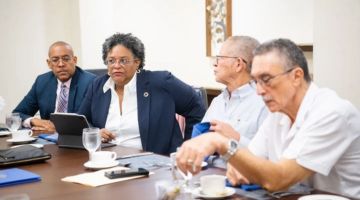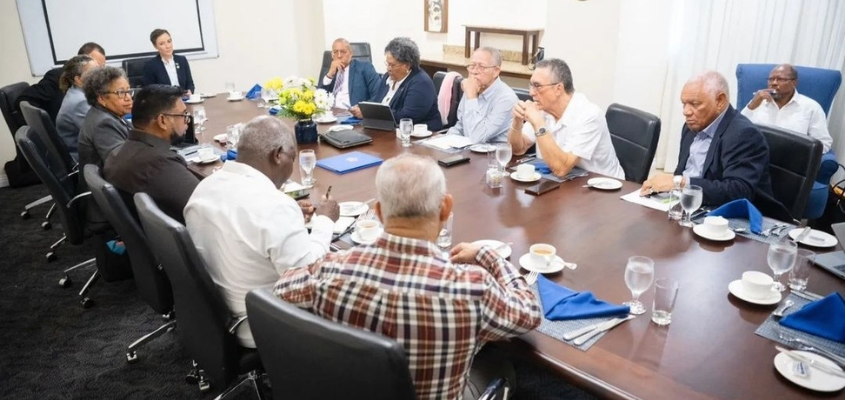You are using an out of date browser. It may not display this or other websites correctly.
You should upgrade or use an alternative browser.
You should upgrade or use an alternative browser.
Haiti: Nearly a Million People Took to the Streets.They Want the Western-imposed government out of
- Thread starter loyola llothta
- Start date
More options
Who Replied?loyola llothta
☭☭☭
Last edited:
loyola llothta
☭☭☭
loyola llothta
☭☭☭
loyola llothta
☭☭☭
Last edited:
loyola llothta
☭☭☭
Last edited:
loyola llothta
☭☭☭
loyola llothta
☭☭☭
Nkrumah Was Right
Superstar
Wyclef doesnt know Musk is a white supremacist Boer?
Grand Conde
Superstar
Why dafuq would the US want to invade Haiti? 

CrownHeights
Superstar
That country has been a mess from the very beginning.
Betrayal, would be emperors, traitors and so on.
Haiti is a failed state regardless of who is to blame. Sad, real sad.
Betrayal, would be emperors, traitors and so on.
Haiti is a failed state regardless of who is to blame. Sad, real sad.
Secure Da Bag
Veteran
loyola llothta
☭☭☭
loyola llothta
☭☭☭
loyola llothta
☭☭☭
CARICOM, Regional Arm of the Core Group, Sells Out Haiti Again.
Kevin Edmonds
10 Apr 2024
Link:

 www.blackagendareport.com
www.blackagendareport.com
Kevin Edmonds
10 Apr 2024
Don’t be fooled by the "progressive" rhetoric of the leaders of the Caribbean Community (CARICOM). What they’re doing in Haiti is shamelessly serving the interest of US empire.
One can be forgiven for being confused about the situation unfolding in Haiti, with all of the moving parts inside the country and, outside, the CARICOM-led construction of a Transitional Presidential Council and a looming “Kenyan-led” (and U.S. run) military intervention. This is not an accident; it is a carefully crafted distraction. A great deal of effort has been spent to make it appear that the process underway in Haiti is a result of “Haitian-led” initiatives, spearheaded by regional allies in CARICOM, out of genuine concern for Haiti and its peoples.
Upon a basic review of the facts, however, it becomes clear that CARICOM is, once again, working in the service of the US empire. Barbados Prime Minister Mia Mottley and Guyana President Irfan Ali are providing cover for the US, taking charge of the Transitional Council and attempting to make it appear as an independent CARICOM initiative, and not the latest iteration of CORE Group rule in Haiti.
For those unfamiliar, the CORE Group is an unelected imperial body that has taken upon itself to determine the path of Haiti’s political and economic trajectory since the 2004 coup against democratically elected president, Jean Bertrand Aristide. The CORE Group is made up of representatives from Brazil, Canada, France, Germany, Spain, the European Union, the United States, and the Organization of American States. Within this grouping are a number of Caribbean states, who are often overlooked and fly under the radar due to the heavy handed presence of the United States and Canada in Haitian affairs.
After 20 years of repeated blunt force trauma at the hands of the CORE Group’s political interventions, a new strategy is being deployed in Haiti. Many observers are unfortunately fooled by Caribbean leaders like Mottley and Ali who are branding themselves as radical with seemingly anti-colonial rhetorical soundbites. However, their actions on Haiti reveal that they remain little more than imperial errand girls and boys, because directly behind them, the CORE Group is openly funding, providing military training and diplomatic support for this supposed CARICOM led intervention.
Despite the spin that CARICOM is taking a progressive stance on Haiti to save it from another US/Canada-led intervention, the region has a very shameful record when it comes to dealing with both the Haitian government and the Haitian people. Across the Caribbean, Haiti and the Haitian people have been treated inhumanely, with anti-Haitian sentiment finding itself bolstered into official policy by the very same countries that now claim to be helping.
The Jamaican government has admitted to not wanting to be faced with “an avalanche” of Haitian refugees, has been critiqued for its policy of forcibly returning Haitian asylum seekers , and has returned boats containing Haitian refugees back to Haiti. Guyana faces potential international sanctions over its respective treatment of Haitian refugees, in a case recently reviewed by the Inter-American Commission on Human Rights (IACHR). Haitians in the Bahamas, numbering an estimated 70,000 (close to 25 percent of the population), face systemic discrimination, are repeatedly targeted by the Bahamian government as a scapegoat for a myriad of problems, and are condemned to terrible living conditions. In 2021, the United Nations called on the Bahamas to cease plans to bulldoze a community of 600 homes , which housed Haitian migrants.
So while individual Caribbean governments have terrible records towards Haitians, and have long viewed Haitians as a regional security threat, Caribbean leaders are now taking their reactionary politics directly to the country through the CARICOM-led Transitional Council, which is little more than a front for the CORE Group. A brief examination of the timeline of intervention helps to support this argument: that CARICOM is taking a leading role in legitimizing foreign intervention in Haiti, literally selling out Haiti for increased funding, while using the current political crisis in Haiti as a way to both improve their own political fortunes domestically, regionally, and internationally.
On February 14, 2023, CARICOM leaders met with Canadian Prime Minister Justin Trudeau and the Assistant U.S. Secretary of State, Brian Nichols, in the Bahamas. Bahamian Prime Minister Phillip Davisremarked that "We do not have the resources to be able to deal with the Haiti problem ourselves, and we do need outside help," urging Canada and the United States to "come to the fore to help." Following that meeting in the Bahamas, two days later, on February 16, 2023, it was announced that Canada would provide $44.8 million in new funding for CARICOM initiatives.
On February 27, 2023, Jamaican Prime Minister Andrew Holness led a one-day CARICOM Special Mission to Haiti, to speak with a variety of Haitian stakeholders to get a better understanding of how to move forward out of the intersecting security and political crises. At the time, the focus was on supporting the Haitian National Police, but the press release also stated that there was an effort underway to engage with African support for Haiti, in combination with continued influence of the US and Canadian governments on Haiti.
In May 2023, CARICOM announced the creation of an Eminent Persons Group , made up of former leaders and CARICOM representatives to engage with Haitian stakeholders. Over the next six months and several visits, CARICOM would table a proposal which would see Ariel Henry remain in power for another 18 months while elections were organized.
While this was happening, the first Canada-CARICOM Summit was held in October 2023, during which Canada committed $85.7 million to various CARICOM initiatives, and also committed up to $58.5 million to the Caribbean Development Bank. The Government of Canada also noted at the summit that since 2022, it has “committed more than $300 million in international assistance to respond to the crisis in Haiti”. Putting this into context, as the statistics on the top recipients of Canadian foreign aid are infrequently updated and do not include military aid (Ukraine would be a clear first with over $3 billioncommitted for 2024), according to Global Affairs Canada , this funding would place Haiti as one of Canada’s top foreign aid priorities, ahead of Ethiopia, Afghanistan, and Bangladesh.
On February 27, 2024, Canada announced that it was providing a $120 million loan to the Government of Guyana, and an additional $39.2 million in funding for Haiti, Belize, Dominica, Grenada, Guyana, Jamaica, Saint Lucia, Saint Vincent and the Grenadines, and Suriname.
Link:

CARICOM, Regional Arm of the Core Group, Sells Out Haiti Again. | Black Agenda Report
Don’t be fooled by the "progressive" rhetoric of the leaders of the Caribbean Community (CARICOM). What they’re doing in Haiti is shamelessly serving the interest of US empire.
